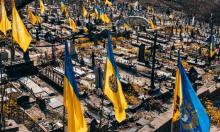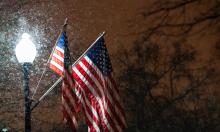U.S. forces depart house where 8 suspected terrorists killed
U.S. forces left a cordoned area around a house in the northern city of Mosul on Monday where eight suspected al-Qaida members died in a gunfight last weekend, and the White House said it was "highly unlikely" that the terror leader Abu Musab al-Zarqawi was among the dead.
North of the capital, Diyala provincial police said a car bomb targeting U.S. Humvees exploded in the town of Kanan, killing five civilians and wounding 12 bystanders. At least 145 Iraqi civilians have died in a series of attacks over the last four days, including two bombings at Shiite mosques and another at a funeral in religiously mixed Diyala province.
Elsewhere, an American soldier near the capital and a Marine in the western town of Karmah were killed in separate insurgent attacks over the weekend. In the southern city of Basra, a British soldier was killed and four others wounded by a roadside bomb.
During the intense gunbattle in Mosul on Saturday, three insurgents detonated explosives and killed themselves to avoid capture, Iraqi officials said. Eleven Americans were also wounded, the U.S. military said.
On Saturday, police Brig. Gen. Said Ahmed al-Jubouri said the raid was launched after a tip that top al-Qaida operatives, possibly including al-Zarqawi, were in the house.
However, Trent Duffy, a White House spokesman, said Sunday that reports of al-Zarqawi's death were "highly unlikely and not credible." Eyewitnesses in Mosul said the U.S. military, which had cordoned off the area around the two-story house, left the area early on Monday.
"We have no indication that Zarqawi was killed in this fight and we continue operations to search for him," said Lt. Col. Barry Johnson, a U.S. military spokesman.
The elusive al-Zarqawi has narrowly escaped capture in the past. U.S. forces said they nearly caught him in a February 2005 raid that recovered his computer.
The U.S. military also said Sunday that 24 people, including another Marine and 15 civilians, were killed the day before in an ambush on a joint U.S.-Iraqi patrol in Haditha, west of Baghdad in the volatile Euphrates River valley.
The three American deaths brought to at least 2,094 the number of U.S. service members who have died since the war began in March 2003, according to an Associated Press count.
In Washington, Defense Secretary Donald H. Rumsfeld said Sunday on ABC television's "This Week" that commanders' assessments will determine the pace of any military drawdown. About 160,000 U.S. troops are in Iraq as the country approaches parliamentary elections Dec. 15.
The Pentagon has said it plans to scale back troop strength to its pre-election baseline of 138,000, depending on conditions. Rumsfeld said Iraqi security forces, currently at 212,000 troops, continue to grow.
Rumsfeld also said talk in the United States of a quick withdrawal from Iraq plays into the hands of the insurgents.
"The enemy hears a big debate in the United States, and they have to wonder maybe all we have to do is wait and we'll win. We can't win militarily. They know that. The battle is here in the United States," he told "Fox News Sunday."
In Cairo, Egypt, Iraq's president said Sunday he was ready for talks with anti-government opposition figures and members of Saddam Hussein's outlawed Baath Party, and he called on the Sunni-led insurgency to lay down its arms and join the political process.
But President Jalal Talabani, attending an Arab League-sponsored reconciliation conference, insisted that the Iraqi government would not meet with Baath Party members who are participating in the Sunni-led insurgency.
"I want to listen to all Iraqis. I am committed to listen to them, even those who are criminals and are on trial," Talabani told reporters, but adding that he would only talk with insurgents if they put down their weapons, reports the AP. I.L.
Subscribe to Pravda.Ru Telegram channel, Facebook, RSS!




